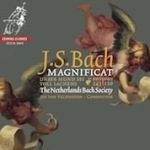Bach’s Magnificat in D major is one of those rare works in which music and text are brought together in perfect symmetry and harmony, all of its dimensions–rhythms, dynamics (in all senses of the word), and temporal relationships–ideally conceived and supremely functional, not to mention the work’s incredible economy of form and performing resources. Of course, it’s up to the conductor and performers to understand these relationships and execute them effectively, and you need a first-rate group of soloists (more than half of the work’s movements are set for solo singers).
There are many pretty-good-to-excellent recordings of this beloved, oft-performed masterpiece–the now most-familiar D major setting is a revision of Bach’s original E-flat version from 1723–and this new release from Channel Classics and The Netherlands Bach Society takes a place among the best.
Prospective listeners must be aware that conductor Jos van Veldhoven determined to apply to this performance a structural feature particular to Bach’s E-flat version of the work–that is, he felt it would be “obviously attractive” and “entirely in keeping with the tradition of the 17th and 18th centuries” to follow the earlier practice of inserting Christmas “interludes” or “interpolations” at specific points among the Magnificat’s movements.
But rather than just take the four seasonal insertions that Bach used (which were based on four hymns from a Christmas cantata by Johann Kuhnau), Veldhoven took the opportunity to feature different works, including a couple by 17th-century Netherlands composers Sweelinck and Verrijt (along with two pieces by German composers Johann Michael Bach and Johann Hermann Schein). So instead of just another straight-ahead reading of the Magnificat, we hear one “interrupted” by these four “Einlagen”, which, although not really authentic regarding the D major’s performance history, nevertheless makes us listen to this very familiar work in a new way–not necessarily a bad thing.
For those who know the previous work of The Netherlands Bach Society and Jos van Veldhoven, it goes without saying that the choral and orchestral performances are exemplary, and for me the soloists are mostly on top form–my only reservation concerns Johannette Zomer’s slightly uneven tonal control and execution in her “Et exsultavit” aria in Magnificat.
The program’s opening–the cantata for Christmas Day BWV 110, with the wonderful title, from Psalm 126, “Unser Mund sei voll Lachens” (Then was our mouth filled with laughter)–begins with one of Bach’s signature infectious, exuberant, extended choruses, followed by a series of affecting arias for tenor, alto, soprano/tenor, and bass, accompanied by typically colorful instrumental obbligatos and solid continuo. Alto William Towers is especially engaging, as are tenor Charles Daniels and soprano Dorothee Mields–not to mention bass Stephan MacLeod’s truly rousing “Wacht auf, ihr Adern und ihr Glieder” (Wake up, ye nerves and all ye members…), elevated to supreme heights by those magnificent trumpets!
This is terrific Bach singing and playing, and even if you already own one or two or three Magnificats, you won’t be sorry to add this one–so vibrant and fresh-sounding, and possessed of the hopeful, optimistic spirit of the texts and music. And the sound, well, Channel Classics has a lock on whatever combination of technical know-how and magic is involved in making consistently demonstration-quality recordings. Don’t hesitate to include this in your holiday-season acquisitions. Highly recommended. [11/24/2010]
































